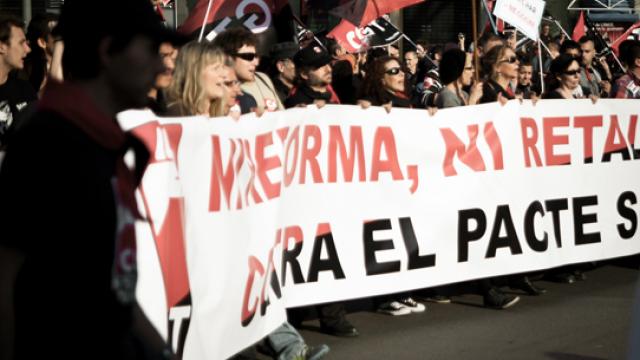
In December 2010, Tunisian street vendor Mohamed Bouazizi drenched himself in fuel in the middle of Sidi Bouzid town square and lit himself on fire, a traditional form of protest. Eighteen days later, Bouazizi died, and four days after that, President Zine el Abidine Ben Ali’s 23-year dictatorship crumbled. Bouazizi’s self-immolation generated a wave of resistance across all areas of the world.
The people’s epoch of protest has not come easily, but no revolution ever has. Censorship, brutality, arrest and murder have greeted protesters to derail their struggle for liberation. But as last year’s Arab Spring has proved, once the oppressed have lost their fear and tolerance for tyranny, real revolution and change is possible.
An International Uprising
Now that the people of the Middle East have paved the way for emancipation, the afflicted working classes across the world are stirring up mass waves of upheaval, each fighting for their own distinct struggles. So far, this Global Spring has activated hundreds of thousands in nearly every country to take the streets, mobilize and launch an international revolution.
March brought the revitalization of resistance communities all over the world:
• The Socialist Unity Centre of India has reclaimed the streets of New Delhi to rally against unemployment, lack of education opportunities and violence against women and children in India.
• When the Indonesian government announced fuel price hikes of more than 30 percent, thousands poured into Jakarta to protest and were met with tear gas and water cannons.
• On the six-month anniversary of Occupy Wall Street, protesters reignited the American uprising against capitalism and corporate greed in all areas of the country.
• More than 200,000 Canadian students marched to protest tuition hikes in Montreal and awoke a student movement fighting for accessible education.
• Portuguese protesters conducted a general strike against austerity measures after a €78 billion-euro bailout last year.
• More than 400 people gathered in Moscow after taking the streets to mobilize against state television propaganda programming condemning opposition rallies.
• The Pakistan working class took over a petrol station to oppose power cuts in Lahore that have intensified the country’s current economic crisis. Protesters blocked roads and occupied government offices. A general strike also took place in the industrial city of Faisalabad.
• The Aysén Social Movement in Chile has made great strides against its government tormentors and has worked to provide the working class with better working conditions, healthcare, education and city infrastructure.
• About 40 people were killed in this week alone in Syria as a continued backlash against the Arab Spring and activist groups. More than 9,000 have been killed in the yearlong conflict, but protests and marches persist.
• Countless marches have sprung up in the United States to assemble against racism in the dozens of protests that demanded justice for murdered teenager Trayvon Martin.
• Jamyang Palden set himself aflame in the town of Rongwo in China to protest the country’s occupation of Tibet, where government officials have cut off Internet and international news access. Palden is the 27th person in the last year to self-immolate in protest.
• Protests broke out across Spain on March 29 in opposition to austerity measures. Some were aggressive. The protests came right before Prime Minister Mariano Rajoy announced $40 billion in program spending cuts and tax hikes for the working class.
• Pro-Tibet activists demonstrated against the visit of Chinese president Hu Jintao in New Delhi. At issue are human rights violations perpetuated by the Chinese government in Tibet.
• On March 30, Land Day protests led to police brutality in Palestine. The protests commemorated the six Palestinians killed by Israeli soldiers in 1976 during a demonstration against Israel seizing land in Galilee. Coordinated international solidarity actions are simultaneously taking place around the world.
…and was just in March.
The first week of April has also been an internationally active time of protest, as well:
Dimitris Christoulas, a 77-year-old Greek man, shot himself in the head in the middle of an Athens public square in response to the country’s debt crisis, which drowned Christoulas and his family.
Thousands took to the streets of Morocco in response to the soaring prices of necessities, including food and water, and high unemployment rates. The government has responded by withholding the protesters' pay.
Hundreds of protesters stormed the NATO headquarters in Brussels to mobilize against nuclear weapons and the war in Afghanistan.
About 30 people were pepper-sprayed and two were hospitalized when Santa Monica College students marched to the president’s office to protest tuition hikes.
These are just a few of the communities of resistance that have assembled and organized against their oppressors, continuing the legacy of revolution that a street vendor named Mohamed Bouazizi helped spark.
Solidarity in Revolution
As the globalization of government and markets has come to be the way of the world, oppressive regimes and capitalist interests have terrorized working classes and distorted countries’ economies.
But the working class is using internationalism to its benefit; one country’s struggle has become a rallying cry for another. This cross-border solidarity has acted as fuel to enrage and motivate working class groups as they begin their own emancipation. Globalization has forced people to see that revolution cannot just happen in one country; it must be an international effort to crush the oppressive forces of government control, greed, violence and war everywhere. This conflagration of dissent is spreading purposefully and is poised to continue the power shift from the oppressive to the oppressed.
Those maintaining the status quo are scared, too. The use of violence against protesters only demonstrates government’s belief that uprisings can and will eventually topple them. Brutality cannot and has not prevented activists all over the world from continuing their plight for basic human rights.
The Global Spring has arrived, but this is only the beginning of the emancipation of the world’s working class and oppressed.
3 WAYS TO SHOW YOUR SUPPORT
- Log in to post comments













